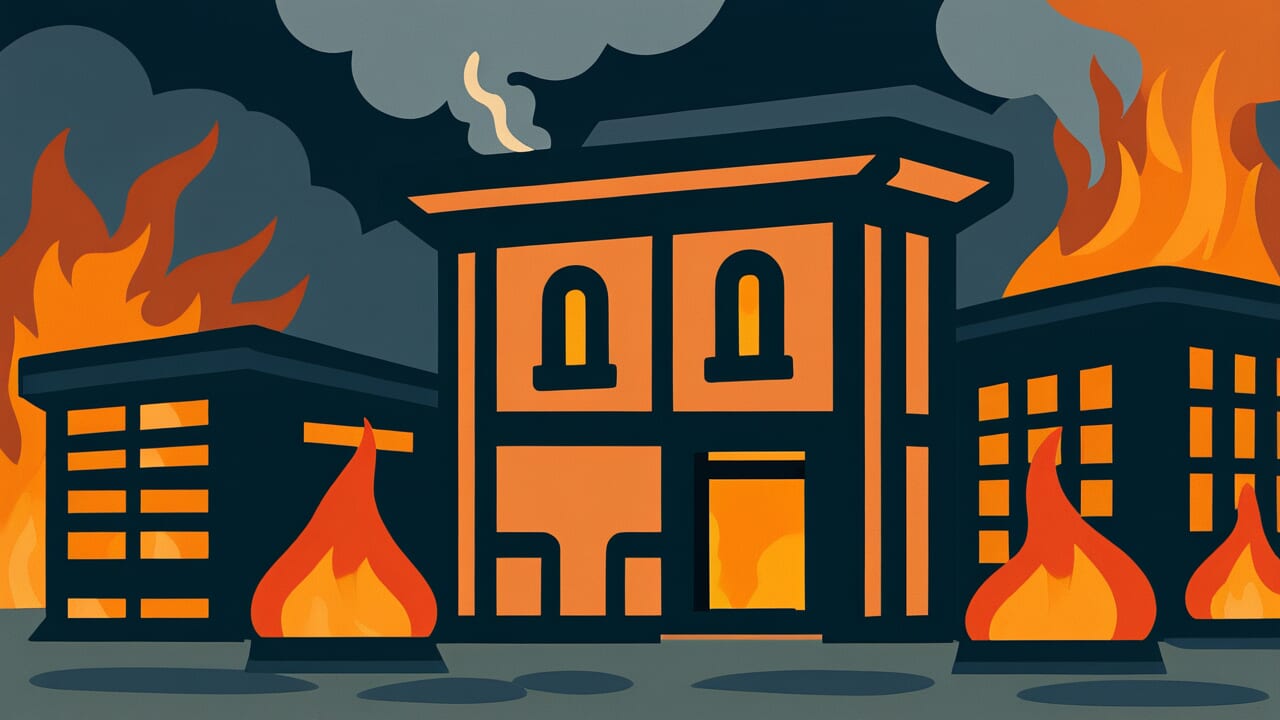How to Read “The storehouse catches fire”
Okura ni hi ga tsuku
Meaning of “The storehouse catches fire”
“The storehouse catches fire” is a proverb that warns about situations where you risk losing valuable assets. It describes moments when carelessness or poor management could lead to irreversible loss.
This proverb is used when damage hasn’t happened yet, but warning signs appear. If you notice before the fire starts, you can put it out. But once flames spread, it’s too late.
Common situations include poor financial management in business, sloppy household budgets, or weak systems for protecting important assets.
Today, risks have diversified. Investment failures, fraud, data breaches – all can destroy wealth. But the proverb’s core truth remains unchanged.
Small carelessness leads to big losses. This cause-and-effect relationship is what “The storehouse catches fire” captures so powerfully.
Origin and Etymology
No clear written records document this proverb’s origin. However, it likely emerged from the daily realities of merchant and farming families during the Edo period.
Back then, storehouses weren’t just storage buildings. They symbolized a family’s entire wealth. Rice, fabric, money, important documents – everything supporting a household’s life was kept in the storehouse.
In an era of wooden architecture, fire was the most feared disaster. If a storehouse caught fire, a family’s fortune turned to ash in moments.
What’s interesting is how this proverb became a warning against daily carelessness, not just fire itself. Storehouses were usually built away from main houses with fire prevention measures.
For a fire to start anyway meant someone was careless or negligent in management.
For merchant families, the phrase “building a storehouse” symbolized prosperity. This made the proverb even more powerful.
Wealth built through hard work could vanish from a moment’s carelessness. Our ancestors captured this terror in the simple phrase “The storehouse catches fire” and passed it down through generations.
Interesting Facts
During the Edo period, wealthy merchant families commonly owned multiple storehouses. They were called “First Storehouse,” “Second Storehouse,” and so on. The most precious items went in the first storehouse.
Without fire insurance, storehouse placement and fire prevention were matters of family survival.
Storehouse doors were made with thick earthen walls. During fires, they sealed the interior to cut off oxygen.
Yet “The storehouse catches fire” still emerged as a saying. This teaches that no matter how strong your defenses, human carelessness can’t be completely prevented.
Usage Examples
- That company’s accounting is so sloppy, the storehouse catching fire is just a matter of time
- I almost got tricked by that investment scheme – the storehouse nearly caught fire
Universal Wisdom
“The storehouse catches fire” contains deep insight into fundamental human weakness. We react sensitively to visible crises but become dull to dangers that creep up slowly.
Losing wealth rarely happens suddenly. It’s an accumulation of small carelessness, minor shortcuts, and “this should be fine” judgments.
But human psychology makes us postpone action when problems are small. We think “still okay” and delay. Sparks are easy to extinguish, yet we panic only when flames rise.
This proverb endures because this human trait transcends time. Prosperity breeds carelessness, and carelessness brings loss. This cycle has repeated from ancient times to today.
The proverb also contains the truth about “the difficulty of protecting things.” Building wealth takes years, but losing it takes an instant.
Destruction is easier than creation. Our ancestors expressed this asymmetry of the world through the concrete image of a storehouse fire.
It’s not just a warning. It’s profound wisdom that prompts awareness of life’s fundamental instability.
When AI Hears This
A storehouse is a wealth accumulation point, what system theory calls a “stock.” Years of gradually stored rice and assets concentrate in one place.
What’s notable is the asymmetric influence that fire, a single factor, has on this entire stock. Accumulation requires long time and many actions, yet destruction completes instantly.
In systems thinking, intervention points that create big changes with little force are called “leverage points.” Fire in a storehouse is exactly this – the strongest leverage point that reduces the entire system’s value to zero.
Interestingly, the higher the storehouse’s value, the more proportionally the destructive power of fire increases. A storehouse with one million yen versus one hundred million yen – the same fire causes a hundredfold difference in loss.
Modern systems show the same structure. Data center cooling failures, bank core system crashes, factory main line stoppages – single-point vulnerabilities instantly eliminate total value.
Diversified investment and backups are emphasized because we understand this structural vulnerability of “single failure to concentrated stock.”
Edo-period people grasped experientially the risk that physical wealth concentration in storehouses carried.
Lessons for Today
This proverb teaches modern people that protecting precious things requires accumulating small daily attentions. This isn’t a restrictive way to live. Rather, it’s building a foundation to move forward with confidence.
In modern society, the forms of “storehouses” we must protect have diversified. Bank account balances, personal information, health, relationships, careers.
These are all precious assets built over long periods. And any can be lost in a moment of carelessness.
But there’s no need to fear. What this proverb truly wants to convey is the importance of “noticing.” If you notice danger signs early, you can respond.
Develop a habit of regularly inspecting your “storehouse.” That’s the best way to protect your life.
You don’t need to be perfect. Just maintain awareness to catch the “this should be fine” moments of carelessness.
That alone will protect what matters to you. The wisdom of our ancestors can still be a light illuminating your life today.



Comments